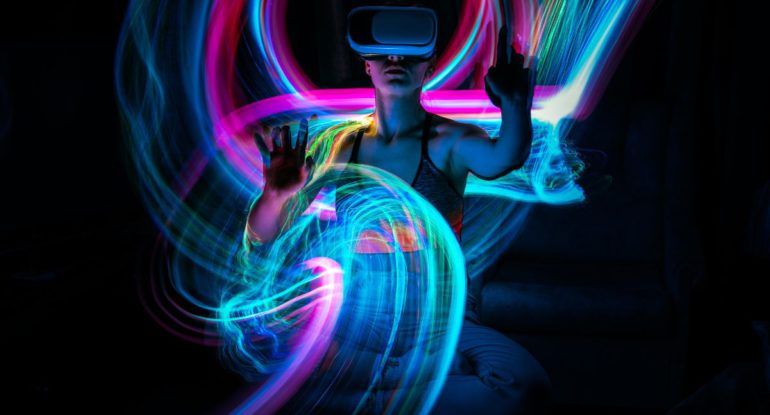The Metaverse And Education: Using Virtual Reality To Revolutionize Learning

The concept of the Metaverse has been a popular topic among tech enthusiasts, gamers, and futurists for several years now. The Metaverse is essentially a virtual reality space where users can interact with each other and their surroundings through avatars. It’s a fully immersive environment that can be accessed through VR headsets, computers, or mobile devices.
One of the most exciting applications of the Metaverse is in the field of education. Virtual reality technology is being used to revolutionize the way we learn and teach.
Education, innovation, and motivation without limitation all rolled together in one metaverse. The #UniversityPavilion will change the way we learn. This is the https://t.co/gV643a6rMj! 🔥🔥🔥@USMverse pic.twitter.com/SxDIjRSarV
— Abiodun (@abbyboi23) April 17, 2023
How the Metaverse is transforming education and what the future of learning could look like.
- Enhancing Engagement and Retention
Traditional methods of learning can be boring and ineffective for many students. The Metaverse provides an immersive and engaging experience that can keep students interested and motivated. It allows learners to interact with their surroundings and actively participate in their own education, which can lead to better retention and understanding of the material.
- Creating Interactive and Collaborative Learning Environments
In the Metaverse, students can collaborate with each other and their teachers in virtual classrooms or group projects. This can create a more interactive and social learning experience that can help students feel more connected to their peers and teachers.
- Providing Access to Remote and Diverse Learning Opportunities
The Metaverse also has the potential to provide access to education for people who might not have had the opportunity otherwise. It can be used to provide remote learning opportunities for students who live in rural or isolated areas. It can also provide access to diverse learning experiences that might not be available in traditional classrooms.
- Simulating Real-World Scenarios
Virtual reality technology can be used to simulate real-world scenarios that can help students gain practical experience and prepare for future careers. For example, medical students can practice surgeries in a virtual operating room, or engineering students can build and test structures in a virtual environment.
- Personalizing Learning Experiences
The Metaverse can also be used to personalize learning experiences for individual students. It can adapt to each student’s learning style and pace, providing a customized and tailored education experience.
The Metaverse has the potential to revolutionize education, making it more engaging, interactive, and accessible. It can enhance traditional methods of learning and provide new and innovative approaches to education. As technology continues to advance, we can expect to see even more exciting applications of the Metaverse in education.
Also, read – How Web3 Or Metaverse Will Metamorphose Education System?
Top 5 challenges Metaverse can face in the education sector
As with any new technology, the metaverse can face challenges in the education sector. These challenges can include accessibility, affordability, equity, privacy and security concerns, and integration with existing education systems. However, the potential benefits of using the metaverse in education, such as improved engagement, interactivity, and access to a wider range of resources and experiences, make it an exciting and promising area for exploration and development. As technology evolves and becomes more accessible, these challenges may become easier to address and overcome.
- Accessibility: One of the biggest challenges of using the metaverse in education is ensuring that it is accessible to all students, regardless of their location, socioeconomic status, or physical abilities.
- Affordability: Another challenge is the cost of implementing and maintaining a metaverse-based education system, including the development and deployment of virtual reality hardware and software.
- Equity: The metaverse also presents challenges related to equity, such as ensuring that all students have access to the same opportunities and resources within the virtual environment.
- Privacy and Security: As with any technology, there are concerns around the privacy and security of student data in a metaverse-based education system. This includes issues such as data breaches, cyber attacks, and the collection and use of student data for commercial purposes.
- Integration with Existing Education Systems: Finally, integrating the metaverse with existing education systems presents a challenge, particularly in terms of curriculum development and teacher training. There may also be resistance from some educators and institutions who are hesitant to adopt new technologies.
Conclusion
The metaverse has the potential to revolutionize education by providing immersive and interactive learning experiences that are not limited by physical boundaries. The use of virtual reality and other advanced technologies can enhance the quality of education and make it more engaging for students, enabling them to learn and explore in previously impossible ways.
However, it is important to note that some challenges still need to be addressed before the metaverse can be fully integrated into the education system. These challenges include issues of accessibility, affordability, and equity, as well as concerns around privacy and security.
Nevertheless, with the continued development and evolution of the metaverse, we can expect to see more innovative and effective ways of using virtual reality to revolutionize the way we learn and teach. It is an exciting time for education and technology, and the metaverse is poised to play a significant role in shaping the future of learning.


























































